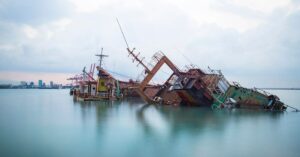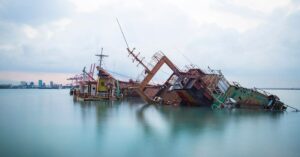Greek Court Dismisses Charges Against 9 Egyptians Accused Of Deadly Shipwreck That Killed Hundreds of Migrants

Goa Shipyard Employee Arrested For Sharing Confidential Naval Data With Pakistan’s ISI
May 22, 2024
MV Dali Ship Crew Forced To Stay Onboard Without Cellphones Since Baltimore Bridge Collapse
May 22, 2024

A Greek court dropped the trial of nine Egyptian men accused of causing a horrific migrant shipwreck, concluding that the incident occurred in international waters and, hence, beyond its jurisdiction.
Protesters outside the court cheered as justices in Kalamata, a southern port city, made their decision.
The sad tragedy occurred on June 14, 2023, when the overcrowded fishing boat Adriana, carrying up to 750 migrants from Egypt, Pakistan, and Syria, capsized in one of the Mediterranean Sea’s deepest waters.
The ship, which had left Libya heading for Italy, capsized near the Greek town of Pylos.
More than 600 people are believed to have drowned, including 100 women and children trapped in the boat’s hold.
While 82 bodies were recovered, the United Nations estimates that approximately 500 people are still missing.
The nine suspects, aged 20 to 41, were charged with human smuggling, causing the shipwreck, and working in a criminal firm.
If convicted, they might have faced lifetime imprisonment.
However, the court found them not guilty of these crimes, stating the incident’s location in international waters, even though it occurred within Greece’s restricted rescue region.
As a result, the individuals were relieved of illegal entry into Greece and not identified as smugglers.
The trial’s dismissal has sparked great debate.
Survivors and human rights organisations, including Amnesty International and Human Rights Watch, have questioned the credibility of the Greek investigation and the impartiality of the trial.
The accusation against the nine Egyptians was based on testimony from survivors, some of whom said the Greek coastguard had forced them to misidentify the defendants as smugglers.
Six survivors claimed that the coastguard’s actions caused the Adriana to capsize.
The Greek coastguard has continuously denied these charges, claiming that their vessel did not attempt a rescue since the Adriana was gradually heading toward Italy and the passengers were not in immediate danger.
However, a previous BBC investigation questioned these statements, implying that the coastguard may have acted inappropriately.
Defence counsel argued that the prosecution’s evidence relied heavily on coastguard interviews.
They claimed no relevant evidence from the remaining 95 survivors was produced in court.
Furthermore, court documents revealed that cell phones, which could have provided necessary video evidence, were not checked because they had been considered permanently damaged by seawater.
The defence also attacked the investigation’s quick nature and lack of proof, alleging that the accused were being scapegoated.
The court’s decision was greeted with applause, and some defendants kneeled and kissed the floor in relief.
A separate probe by the Greek Naval Court into the coastguard’s potential responsibility is still in its early stages.
Human rights groups contend that this investigation should have been completed before criminal proceedings against the Egyptian accused were instituted.
While the Greek government is determined to crack down on unlawful crossings and hold traffickers accountable, it is confident that justice will prevail.
Following the verdict, Human Rights Watch’s Judith Sunderland stressed the importance of meaningful accountability, including determining any Greek authorities’ obligations, to resolve one of the worst shipwrecks in Mediterranean history.
Reference: BBC, FirstPost
Greek Court Dismisses Charges Against 9 Egyptians Accused Of Deadly Shipwreck That Killed Hundreds of Migrants appeared first on Marine Insight – The Maritime Industry Guide
Source: Maritime Shipping News


